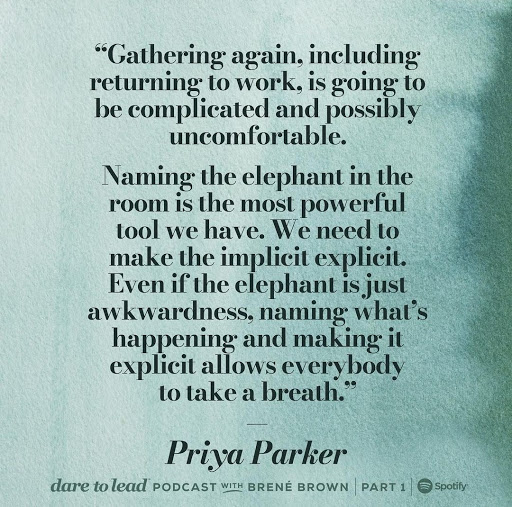
Return to Gathering: Tips and Helpful Ideas on Engaging Your Community Post Covid
By: Sara Mahoney, SC RTAL, Youth Connections
As many more citizens get vaccinated and communities in Montana have lifted their Covid-19 restrictions, in-person gatherings for community-based Prevention work will resume. For many of you- you have already been engaging your community leaders in-person. For others, as you return to office settings and either begin to create or re-establish relationships with your community members- its important to gather resources and an understanding of challenges that may arise.
When researching this topic, I came across the above image/podcast on social media. A huge fan of Brene Brown’s Dare to Lead Podcast, I went and listened to the podcast featuring the author of the book The Art of Gathering and master facilitator Priya Parker. On the podcast, Priya describes her job as, “I help groups have really complicated conversations that they need to have, that they have been avoiding.”
Addressing your community, co-workers, and coalition members on the importance of your work and returning to community-based prevention might seem a little daunting. How do you begin to address indifference, fear, questions, and the importance of your work? Through some additional research and conversations with professional facilitators, I came up with the following talking points.
- People might be super excited to meet and gather and also might be afraid and unsure of what is expected of them. Do they still need to wear a mask? Do you need to account for social distancing? What if someone asks you if you are vaccinated? The most important thing is to have these open conversations. To address the elephant in the room. Ask people what they are comfortable with and how you can be accommodating while still getting the work done. If you offer both in-person or virtual options, it works best to have a facilitator for both. If you are uncomfortable answering vaccination questions, you can kindly address that immunization records are a private medical decision made between you and your physician.
- Ask your coalition/community what they have learned about the work that was done during Covid-19 and working remotely. Also pause and ask how the group worked and what you have accomplished and what is needed right now from everyone who is at the table. The re-assessing of the group is important to make sure everyone is on the same page or that the group can speak to the changes that had to be made.
- Don’t skip over important conversations about coalition needs and an assessment of where the group is- and don’t go straight to logistics.
- There may be some awkwardness when you go to meet people. Are we all done with hand shakes? Are elbow bumps the new thing? We may have to physiologically train ourselves on how we introduce ourselves and notice when we step back from others or when others step back from us- it just may be because we don’t know what others are comfortable with. We are all going to experience micro-moments of perceived rejection. We may walk into a room and reach our hand out, only to have that person lean back away from you. As a leader, it’s our responsibility to name this and speak to it so everyone can understand what is taking place.
- Make the implicit, explicit. Particularly in moments of transition, it’s the responsibility of the host to think about where you are meeting, and how you share that information with the guests so they can make the decisions they want to make.
- When and how do you balance the rights of the individual with the rights and the needs of the group? You may need to make a decision as a coalition leader that gives clarity and comfort to all. Again- it’s important to have these conversations and speak to the challenges that arise.
